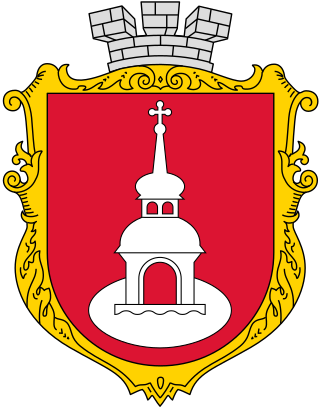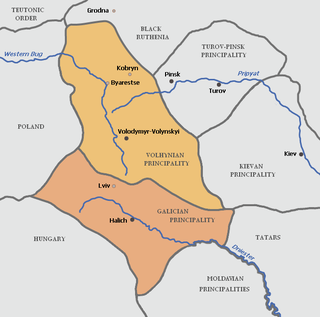
Year 1059 (MLIX) was a common year starting on Friday of the Julian calendar.

Vsevolod I Yaroslavich, ruled as Grand Prince of Kiev from 1078 until his death.
Vladimir Yaroslavich reigned as prince of Novgorod from 1036 until his death. He was the eldest son of Yaroslav I the Wise of Kiev by Ingigerd, daughter of king Olof Skötkonung of Sweden.

Yaroslav I Vladimirovich, better known as Yaroslav the Wise, was the Grand Prince of Kiev from 1019 until his death. He was also earlier the Prince of Novgorod and Prince of Rostov, uniting the principalities for a time. Yaroslav's baptismal name was George after Saint George.
Yaroslav III Yaroslavich (1230–1271) was the first Prince of Tver and the tenth Grand Prince of Vladimir from 1264 to 1271. Yaroslav and his son Mikhail Yaroslavich presided over Tver's transformation from a sleepy village into one of the greatest centres of power in medieval Russia. All the later dukes of Tver descended from Yaroslav Yaroslavich.

Iziaslav Yaroslavich was a Kniaz' (Prince) of Turov and Grand Prince of Kiev from 1054.
Sviatoslav II Iaroslavich or Sviatoslav II Yaroslavich was Grand Prince of Kiev between 1073 and 1076. He was born as a younger son of Grand Prince Yaroslav the Wise, and became the progenitor of the Sviatoslavichi (Svyatoslavychi). His baptismal name was Nicholas.
Boris Vyacheslavich was Prince of Chernigov for eight days in 1077. He was the son of Vyacheslav Yaroslavich, Prince of Smolensk. Following his father's death in 1057, the child Boris was debarred from his inheritance. He died fighting against his uncles—Vsevolod Yaroslavich, Prince of Chernigov and Izyaslav Yaroslavich, Grand Prince of Kiev—on 3 October 1078.
Rostislav Vladimirovich was a landless prince (izgoi) from the Rurikid dynasty of Kievan Rus’. He was baptized as Mikhail. According to the Russian genealogist Nikolai Baumgarten, the mother of Rostislav was Oda of Stade, a daughter of the Stade Count Leopold. That claim is also supported by other historians.
The Kiev uprising of 1068 was a revolt against Grand Prince Iziaslav Yaroslavich of Kiev in the aftermath of a Kievan Rus’ defeat at the hands of the Cumans at Battle of the Alta River near the city of Pereiaslavl, southeast of Kiev.
Izgoi is a term that is found in medieval Kievan Rus'. In primary documents, it indicated orphans who were protected by the church. In historiographic writing on the period, the term was meant as a prince in Kievan Rus' who was excluded from succession to the Kievan throne because his father had not held the throne before, as exemplified by Yaroslav the Wise's two youngest sons becoming izgoi.

The Prince of Pereiaslavl was the kniaz of the Rus Principality of Pereiaslavl, a lordship based on the city of Pereiaslavl on the Trubezh river and straddling extensive territory to the east in what are now parts of Ukraine. It lay on Rus civilization's southern frontier with the steppe.
The Prince of Smolensk was the kniaz, the ruler or sub-ruler, of the Rus' Principality of Smolensk, a lordship based on the city of Smolensk. It passed between different groups of descendants of Grand Prince Iaroslav I of Kiev until 1125, when following the death of Vladimir Monomakh the latter's grandson Rostislav Mstislavich was installed in the principality, while the latter's father Mstislav I Vladimirovich became Grand Prince. It gained its own bishopric in 1136. It was Rostislav's descendants, the Rostaslavichi, who ruled the principality until the fifteenth-century. Smolensk enjoyed stronger western ties than most Rus' principalities.

The Principality of Peremyshl was a medieval petty principality centred on Peremyshl in the Cherven lands.

The Principality of Turov, also called Principality of Turov and Pinsk or Turovian Rus', was a medieval East Slavic principality and important subdivision of Kievan Rus' since the 10th century on the territory of modern southern Belarus and northern Ukraine. Princes of Turov often served as the Grand Princes of Rus early in 10th-11th centuries. The principality's capital was Turov and other important cities were Pinsk, Mazyr, Slutsk, Lutsk, Berestia, and Volodymyr.

The Principality of Volhynia was a western Kievan Rus' principality founded by the Rurik dynasty in 987 centered in the region of Volhynia, straddling the borders of modern-day Ukraine, Belarus, and Poland. From 1069 to 1118, it belonged to Izyaslavichi who primarily ruled from Turov. After losing Turov to Monomakhovichi in 1105, the descendants of Iziaslav Yaroslavovich for a few years continued to rule in Volhynia. From 1154 to 1199, the Principality was referred to as the Principality of Volodymyr when the Principality of Lutsk (1154–1228) was separated.
Oleg Yaroslavich "Nastasich" was a Rus' prince from the Rostislavichi of Tmutarakan. He was prince of Halych.
Volodymyr II Yaroslavych was a Rus’ prince. He was prince of Halych.
Igor Yaroslavich was one of the younger sons of Yaroslav the Wise from the Rurikid dynasty of Kievan Rus’. He was baptized as George.
This page is based on this
Wikipedia article Text is available under the
CC BY-SA 4.0 license; additional terms may apply.
Images, videos and audio are available under their respective licenses.







